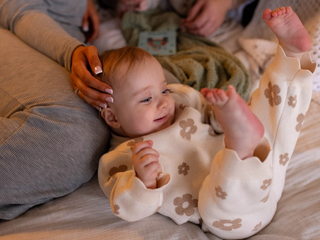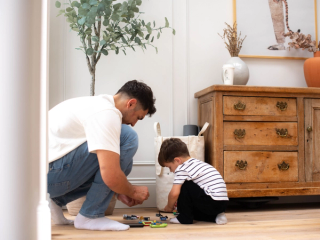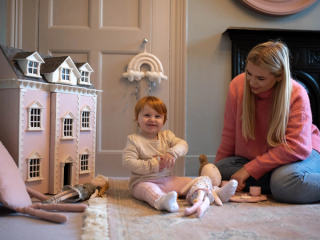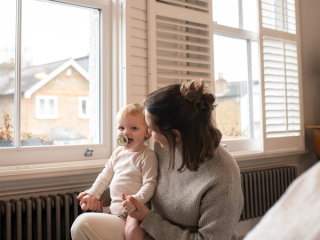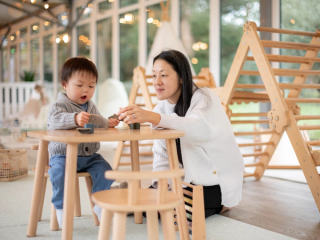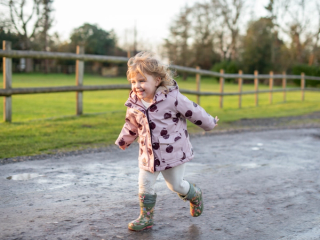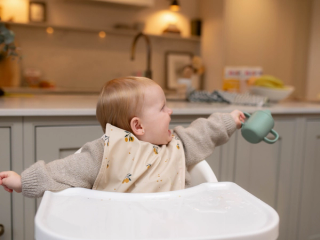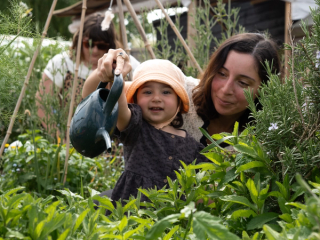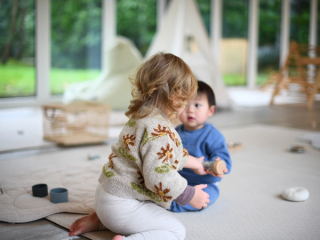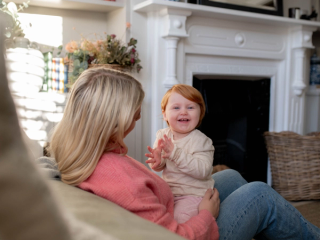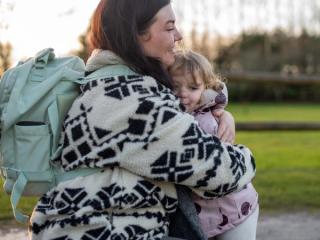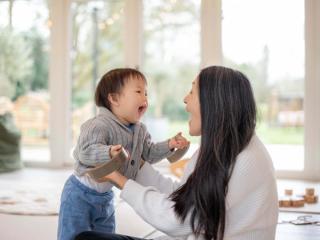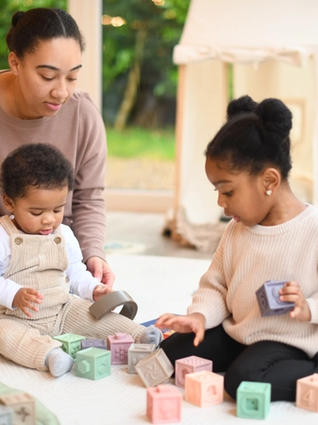
- Home
- Advice Hub
- Toddler
- Toddler Milestones
- Encouraging Toddlers To Socialise And Share
Encouraging toddlers to socialise with other children and sharing
Navigating toddlerhood can be a whole new adventure - learn how to support your little one's social development, encourage sharing, and understand their emotional needs through play.
You’ve reached the milestone of your baby’s first birthday, the early newborn days seem such a blur, you totally feel like you’ve got this parenthood game down to a T and then suddenly you realise your baby isn’t a ‘baby baby’ anymore and there’s a whole host of new scenarios and territories to navigate as they venture into their year as a one year old. Spoiler alert – they will constantly be keeping you on your toes this year for sure!
One of the new challenges many parents face is how to encourage their toddler to socialise and share with other children. Before I delve into some top tips to help you with this, I think it’s really important to lay the foundations first, and that is reassuring you that you know your child best, you know them inside out and by that I mean you know what makes them tick, you know what makes them smile, you know what makes them burst with excitement, and you also know what their triggers may be, limits and general temperament. First things first, use this as your super power!
Tuning into our child’s temperament and understanding their limits is key. Dan Siegel coined the term ‘Window of Tolerance’ and we all have days when our window of tolerance is wider than other days. This means on some days we can be more accepting to things we don’t quite agree with, or we are more up for doing things out of our comfort zone. We are able to learn effectively, play, relate well to ourselves and others around us. But on days when our window of tolerance is low, it is trickier for us to thrive in our day to day life, we may be triggered much easier, our patience is very thin and we aren’t able to empathise with others as well. It’s the same (if not harder!) for our toddlers. I say harder, because our toddlers are at the very earliest of stages of developing their social and emotional skills, to be able to regulate, identify how they are feeling and socialise and share with children effectively is a very new skill they are learning and will be continuing to develop right into early adulthood!
Therefore, by being an attuned adult, we can support our child with their window of tolerance. If they didn’t sleep very well, if they haven’t had lunch yet, if they are feeling a little under the weather all of these things will impact how successfully they are able to share and socialise with other children. So first things first, be mindful of your child’s temperament – how are they feeling today? What can you do to help them and make sure they are in the best state to be able to function? Do they need a snack? A nap? A relax and cuddle? Don’t expect them to behave in an ‘adult way’ where they might be feeling a bit off sorts but can crack on anyway, because they don’t yet have the self-awareness and regulation skills to be able to do this. We need to see the world through their child lens and support them the best we can to navigate these new scenarios they are facing.
Tips for supporting your toddler
Supporting your toddler to socialise and share with other children can best be done through real life interactions with other children. Playing! Play is how children learn, develop and make sense of the world – socially, emotionally and academically. If your child is not in nursery, try to take them to sessions where they will be around other children such as a weekly playgroup or stay and play session. Here they will have to share, have to learn to tolerate other children and have to develop their social skills. Remember to guide them through, be the coach they need, explain why something needs to happen, for example “Ruth had that pram first so we will let her use it a little longer and wait our turn. Then we can have a go, we mustn’t snatch things while someone else is still playing.”
Organising a play date can also be a great way to encourage your toddler to share and socialise. Particularly if it is in their own home as learning to share toys that are theirs can be particularly challenging. Try to avoid forcing toddlers to share and gently encourage them to share through modelling how to share the toy or activity they have. This ensures neither child will feel resentment and will be developing the skills to problem solve independently in these types of situations. I like to do turn taking games during a play date such as musical instruments where they have to wait their turn to play each instrument, rolling a ball back and forth saying “your turn, my turn” and taking turns to drop balls or objects into a container.
At the stage of 12-18 months your child will be observing your behaviour constantly and you’ll notice that they often imitate your actions, for example talking on the phone, giving their teddy hugs or (as my little girl likes to do!) picking up the blusher brush and pretending to put it on her cheeks too! They are learning absolutely everything from your behaviours and so it’s so important for their social development that we set a good example of how to socialise with others and share too. I love to narrate what I am doing, essentially talking out loud for my toddler to hear, as I do it. “Let’s share the bricks. Here’s half the bricks for you and half the bricks for mummy. We’ve shared them together. That’s kind. Now we can both play.” Or “Let’s go and see what Ruth’s doing. Shall we ask if we can play too? We might have to wait a little bit. Please can we play with this doll too? Thank you, that’s very kind.”
As your toddler grows they will begin to link together social scenarios they have previously been in and the behaviours you have shown and spoken about with new social scenarios where they also have to share and begin to develop an understanding of turn taking, sharing and how to socialise effectively.
Advice & tips

Want to read more? Join the HiPP BabyClub for full access to this article.
As a BabyClub member, you'll get access to a range of exclusive benefits, including:
Monthly competitions
Discounts from our Partners
Expert advice tailored to your little one's age
Weaning recipes
HiPP shop discounts*
*10% off HiPP's online shop does not apply to our First Infant, Anti-Reflux or Comfort Formula Milk.
Important notice: Breastfeeding is best. Follow on milk should only be used as part of a mixed diet from 6 months. Talk to a healthcare professional.




